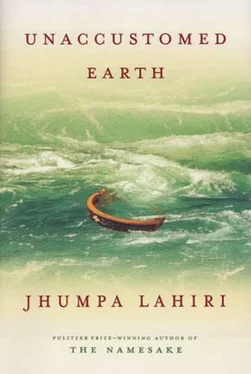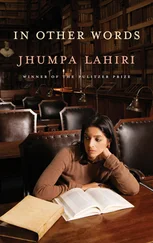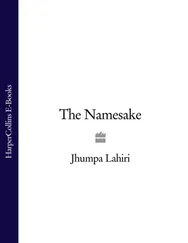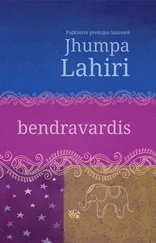"Which is your favorite, KD?"
"Boston Cream."
"I want that one, then."
"Me, too," Rupa said.
"Make it three," I told the cashier.
We sat in a booth, me on one side of the Formica table, my stepsisters on the other. They began eating enthusiastically, not pausing until they were finished, exchanging glances and a sisterly commentary I was not privy to. I ate my donut as well, surprised by how much smaller their mouths were, how much longer it took them to finish compared to me. I felt separate from them in every way but at the same time could not deny the things that bound us together. There was my father, of course, but he seemed to be the least relevant in a way. Like them I'd made that journey from India to Massachusetts, too old not to experience the shock of it, too young to have a say in the matter. They would recall all of this, perhaps not as clearly as I remember those first months at your parents' home, but nevertheless they would remember. Like them I had lost a parent and was now being asked to accept a replacement. I wondered how well they remembered their father; Piu would only have been five at the time. Even my memories of my mother had begun to break apart in the three and a half years since her death, the thousands of days I had spent with her reduced to a handful of stock scenes. I was lucky, compared to Rupa and Piu, having had my mother for as long as I did. The knowledge of death seemed present in both sisters-it was something about the way they carried themselves, something that had broken too soon and had not mended, marking them in spite of their lightheartedness.
"Liked that?" I asked.
Both girls nodded, and Piu said, "Another tooth is loose."
She opened her mouth and pressed a tiny chocolate-stained lower tooth forward with her tongue.
The coffee was too hot to drink, so I removed the lid and set it on the counter. Piu was looking out the window, at the cars pulling in and out of the lot. Rupa was eyeing the donuts on display, the dispensers of coffee, the tanks of bubbling red punch.
"Would you like another?"
She shook her head, avoiding my gaze. She was more reserved than Piu and seemed, at times, unimpressed by her new surroundings. "I would like to bring one home for Ma."
"The one with the colors on top," Piu said, kneeling up in the booth and pointing. "That is prettiest."
Rupa disagreed. "I like the one that is covered in snow."
"Here's a dollar," I said, lifting my hips and reaching for my wallet. "Would you guys like to buy a couple more?"
"We are not allowed to touch money," Rupa said.
"It's only a dollar. Even if you were to lose it between here and there," I said, glancing back at the cash register, "it wouldn't be a big deal."
"Big deal?" Piu asked, knitting her dark brows together.
"Not important."
They slid out of the booth and walked toward the counter, each of them holding a corner of the dollar bill as if it were a miniature banner in a parade. I had my back to the counter so I turned partway around to watch. I saw Rupa pointing, once and once more, then both of them sliding the dollar to the cashier. He folded over the top of the bag and moved it back and forth, unsure which of the girls to hand it to, eventually leaving it on the counter for Rupa.
"Why didn't you say anything?" I asked when they returned.
Rupa handed me the change, looking defensive. "We have done something wrong?"
"No. But you could have said the kind of donuts you wanted instead of pointing, you could have thanked the cashier when he gave them to you. And you should always start off by saying hello."
Rupa looked down at the table. "Sorry."
"Don't apologize. I'm just saying, you guys don't have to be shy. The more you use your English in these situations, the better it will be. It's already good."
"Not like yours," Rupa said. "They will laugh at us in school."
"I am afraid to go to school," Piu said, shaking her head and covering her eyes with her hands.
It was not my intention to reassure them, but it seemed cruel not to. "Look, I know how you feel. A few kids might laugh in the beginning, but it doesn't matter. They laughed at me, too. I came here from Bombay when I was sixteen and had to figure things out all over again. I was born here but it was still hard, leaving and then coming back again."
"It was before your mother died?" Piu asked. She asked this reverently, a bit sadly, as if she'd actually known my mother, or perhaps because it reminded her of her father, I could not tell.
I nodded.
"What was she like?"
"She was-she was my mother," I said, caught offguard by the question. I felt suddenly vulnerable in front of two little girls I'd known less than a day and yet who understood me better, in many ways, than friends who had known me for years. Four years ago my mother would have been the one sitting across from me, sipping her tea, complaining how tasteless it was, after one of our windy walks along the beach.
"Do you have a picture of her?" Rupa asked. For a moment her gaze held mine.
"No," I lied, not wanting to show them the one I carried stuffed behind the ID cards in my wallet. It had been taken during a party in our flat in Bombay, long before her illness, from such a distance that it gave little impression of her face. I had put the photograph, cut down to size, into my wallet after she died, but since then I had never taken it out to look at it.
"Why is there no picture of her in the house?" Rupa asked.
"My father didn't want any."
"Ma has been looking," Piu said. "She has looked in every room. But she cannot find one."
Chitra was sitting on the window seat when we got back, watching for my car. The anxiety in her face was obvious, but she didn't ask what had taken us so long. Piu and Rupa didn't give her a chance, rushing up as if they hadn't seen her for days, handing her the donuts and telling her what a fun trip it was, how generous I'd been, Piu reporting that they'd paid for the donuts themselves. It was obvious that the girls liked me and that, because of her daughters' approval, Chitra was willing to like me, too. But I needed to be alone. The open plan of the house meant it was impossible to watch television or listen to music without engaging with them. Instead I sat on the bed in the guestroom, looking at the yard and leafing through the Globe. Then I went for a run, five cold miles on the winding roads. When I returned, they were eating a heavy Bengali lunch, hunched over plates of rice and dal and the previous night's leftovers. I turned down Chitra's invitation to join them and instead, after my shower, dragged the phone into the guestroom and called Jessica.
"Why don't you just come here?" she suggested. I wished I could, wished I could simply get into my car and drive to her parents' home. But I wasn't capable of walking out, not yet. When I went to return the phone to its place in the hallway, I realized that they were all upstairs, napping, the way my relatives did in India. For the first time since my arrival I stretched out on the sectional, to watch television, and without meaning to I fell asleep myself. They were downstairs when I woke up, within arm's reach but behaving as if I were not there. It was already getting dark outside, the arcing lamp spreading its light over the cocktail table. The channel had been changed to a talk show. Chitra was combing and retying the girls' hair and then proceeded to comb her own. She worked through it with her fingers, a stunning mass that had been contained, until now, in a braid, the smooth strands cascading nearly to her waist. The sight of it repulsed me; I could not help thinking of the hair that had fallen out in clumps from my mother's head, the awful wig she'd worn even in the hospital, up until the day she died, that artificial part of her more healthy-looking than anything else.
Читать дальше












